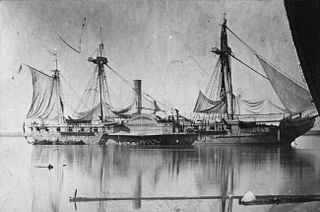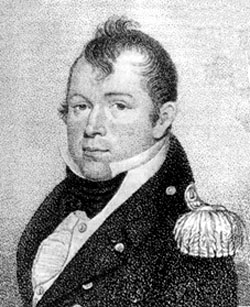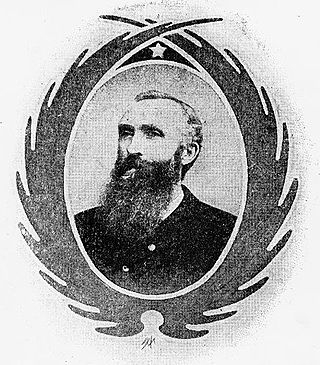Edmund Ross Colhoun was a rear admiral of the United States Navy who served during the Mexican War and the American Civil War, in which he was commended for his participation in the bombardment and capture of Fort Fisher.

USS Mississippi, a paddle frigate, was the first ship of the United States Navy to bear that name. She was named for the Mississippi River. Her sister ship was Missouri. Her keel was laid down by the Philadelphia Navy Yard in 1839; built under the personal supervision of Commodore Matthew Perry. She was commissioned on 22 December 1841, with Captain W. D. Salter in command and launched several weeks later.

USS Commodore Perry was a 512-long-ton (520-tonne) steamer acquired by the Union Navy in 1861, the first year of the American Civil War. She was named after Commodore Oliver Hazard Perry (1785–1819), a naval officer who had commanded American forces on Lake Erie in the War of 1812. In January–February 1862, Commodore Perry was part of the North Atlantic Blockading Squadron, taking part in the attack, in cooperation with the Union Army, which resulted in the surrender of Roanoke Island by the Confederate States of America. She participated in several other campaigns through 1862, including the capture of Elizabeth City, North Carolina, and army–navy expeditions against Franklin, Virginia, and Hertford, North Carolina. From 1863 until the end of the war, she was engaged in patrols, both inland and in Virginia coastal waters.

USSWhitehead, a screw steamer built in 1861 at New Brunswick, New Jersey, served as a gunboat in the United States Navy during the American Civil War.

Jesse Duncan Elliott was a United States naval officer and commander of American naval forces in Lake Erie during the War of 1812, especially noted for his controversial actions during the Battle of Lake Erie.

The Joint Expedition Against Franklin was a joint engagement between the United States Army and Navy against the Confederate States Army during the American Civil War. The engagement was intended to move Union forces into an area where Confederate forces were gathering as they prepared to move on Suffolk, Virginia. Originally planned as a coordinated two-pronged attack with a naval flotilla supporting an infantry advance on Franklin, Virginia, communications delays caused the Union Navy to start the mission before the Army was ready to support it. Instead, October 3, 1862 found Union Naval forces on the Blackwater River greatly outnumbered by Confederate infantrymen and ultimately forced to retreat. The naval action alone is also known as the Action at Crumpler's Bluff or the Battle of Crumpler's Bluff.

Hugh Molloy was a United States Navy sailor and a recipient of America's highest military decoration—the Medal of Honor—for his actions in the American Civil War.
Daniel Lakin was a Medal of Honor recipient in the Union Navy from 1861–1865
James Martin II was a native of Ireland who served in the U.S. Marine Corps during the mid-19th century. Rising up through the ranks from private to sergeant while fighting for the federal government of the United States (Union) during the American Civil War, he displayed conspicuous bravery on August 5, 1864, while serving aboard the USS Richmond. Operating one of that ship's guns under heavy enemy fire for two hours during the Battle of Mobile Bay, Alabama, he helped to damage the CSS Tennessee and destroy artillery batteries of the Confederate States Army at Fort Morgan, even as the enemy's shell and shot damaged his ship and killed several of his shipmates. In recognition of his gallantry, he was presented with the Medal of Honor, the United States' highest award for valor, on December 31, 1864.

Thomas C. Barton was an American seaman who served in the Union Navy during the American Civil War. Barton enlisted in the Navy in June 1861, and resigned in April 1864.
Edwin Smith was a Union Navy sailor in the American Civil War and a recipient of the U.S. military's highest decoration, the Medal of Honor, for his actions during the Joint Expedition Against Franklin.
John Williams was a Union Navy sailor in the American Civil War and a recipient of the U.S. military's highest decoration, the Medal of Honor, for his actions during the Joint Expedition Against Franklin.
Sergeant James H. Burbank was a Dutch soldier who fought in the American Civil War. Burbank received the United States' highest award for bravery during combat, the Medal of Honor, for his action at Blackwater, near Franklin, Virginia on 3 October 1862. He was honored with the award on 27 July 1896.

George W. Ford was an Irish soldier who fought in the American Civil War. Ford received the United States' highest award for bravery during combat, the Medal of Honor, for his action during the Battle of Sayler's Creek in Virginia on 6 April 1865. He was honored with the award on 10 May 1865.

Peter Cotton was an American sailor who fought in the American Civil War. Cotton received the Medal of Honor – the country's highest award for bravery during combat – for his action aboard the USS Baron DeKalb during the Yazoo Pass Expedition between 23 and 27 December 1862. He was honored with the award on 3 April 1863.
Boatswain's Mate Charles Bradley was an Irish sailor who fought in the American Civil War. Bradley received the country's highest award for bravery during combat, the Medal of Honor, for his action aboard the USS Louisville and the Battle of Fort Hindman on January 10 and 11, 1863. He was honored with the award on 3 April 1863.
Private Thomas Burke was an American soldier who fought in the American Civil War. Burke received the United States' highest award for bravery during combat, the Medal of Honor, for his action at Hanover, Pennsylvania on June 30, 1863. He was honored with the award on February 11, 1878.
Corporal Edward Brown Jr. was an Irish soldier who fought in the American Civil War. Brown received the United States' highest award for bravery during combat, the Medal of Honor, for his action during the Second Battle of Fredericksburg and at Salem Heights, Virginia between May 3 and 4, 1863. He was honored with the award on 24 November 1880.
Coxswain Patrick Colbert was an Irish soldier who served in the United States Navy during the American Civil War.
Patrick H. Doody was an Irish soldier who fought in the American Civil War. Doody received the United States' highest award for bravery during combat, the Medal of Honor, for his action during the Battle of Cold Harbor in Virginia on 7 June 1864. He was honored with the award on December 13, 1893.








